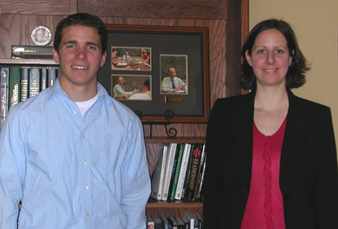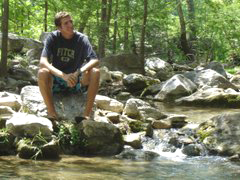|
|

| July 2007 Adrienne Capps, '98, Gives as Good as She Gets Adrienne Capps, ’98, is not afraid to ask for money, nor is she afraid to give it. She has spent her post-Jepson career working in nonprofit fund-raising, most recently as the director of development for the Dyson College of Arts and Sciences at Pace University in New York City. Capps began her association with the Richmond, Va., nonprofit sector when she took Service Learning, a Jepson course which required her to volunteer at an area nonprofit organization. She chose the Boys and Girls Clubs of Metro Richmond, an organization dedicated to enriching and enhancing the lives of disadvantaged youth through quality programs and services. After graduating in 1998 with a double major in leadership studies and business, Capps landed a job with the Boys and Girls Clubs of Metro Richmond as a development assistant responsible for event, annual fund and capital campaign fund-raising. She loved the work from the start. A certified fund-raising executive (CFRE), Capps has worked for a number of nonprofits since her first job with the Boys and Girls Clubs. In particular, she recalled how her career evolved when she moved from Richmond to New York City in July 2002. She accepted a position as the associate director of development for the New York University Child Study Center, a research center dedicated to increasing awareness, prevention, identification and treatment of child and adolescent psychiatric disorders. “This job served as my introduction to philanthropy in New York,” Capps said. “The center’s board comprised very wealthy, high-power people, the New York elite. Board members would make seven-figure donations. “Those types of people expect perfection because they are giving so much money. In Richmond I was excited to get a $500 check. In New York people would routinely write $50,000 checks.” When the center’s director left to take another job only five months after Capps started working there, Capps stepped into the position of acting director of development. She served for almost a year in this role, which she described as a tremendous learning experience, but very stressful due to the constant demands and long work hours that included nights and weekends. Her job at the Child Study Center prepared her well for working in fund-raising in New York City, Capps said, and the connections she made there proved beneficial. For example, her former supervisor at the Child Study Center was working as the assistant vice president of philanthropy at Pace University when he called Capps in summer 2004 and asked her to come to work for him. She accepted. Capps continued to grow professionally in her role as director of development for Pace University’s Dyson College of Arts and Sciences. She will be leaving her job at Pace in August to move to Davis, Calif., with her longtime boyfriend, who will be pursuing a Ph.D. in physics at the University of California, Davis. When asked about the challenges of fund-raising, Capps said she has never hesitated to ask people for monetary contributions because she has always believed in, and been committed to, the missions of the organizations for which she was soliciting funds. Likewise, she didn’t hesitate to make a generous contribution of her own to the Jepson School when circumstances compelled her to action. Capps knew she had to do something when she learned about the Oct. 30, 2004, death of her favorite Jepson professor, Fredric Jablin. “Leadership studies left the biggest impression on me,” Capps said about her undergraduate experience. “Dr. Jablin was such a big part of my leadership experience. I had the most classes with him, including Foundations of Leadership. “Although he was very hard, his style of teaching challenged me in a way that motivated me. Dr. Jablin taught me how to think, how to analyze. It’s a skill that has served me well in my career and as a productive member of society. “I was afraid his memory would fade away. It became important for me to create a legacy for current students to remember him by.” And so Capps created the Jablin Research Fellowship to honor the memory of the man who taught courses in organizational communications and research methodology to scores of Jepson students from 1994-2004. In 2006 the fellowship began awarding $2,000 annually to one Jepson student to conduct a research project during the summer. Guy Peterson, ’07, the first Jablin fellow, researched environmental policy with a focus on renewable energy sources as an intern for U.S. Rep. Jim McDermott, D-Wash., on Capitol Hill during summer 2006. “My internship was absolutely incredible,” Peterson said, “and I was flattered and proud to represent both Adrienne and Dr. Jablin through this research grant.” This summer Garrett Schlein, ’09, the second Jablin fellow, is pursuing a research project titled “Individual and Collective Environmentalism: An Application to Watershed Conservation” under the guidance of faculty member Don Forsyth. Schlein seeks to determine if residents who are more engaged in the civic life of their community are more likely to be concerned with protecting and enhancing the physical condition of their community’s watershed. “We have a definitive trend regarding social orientation and proactive environmental activity,” he reported on July 13 after analyzing the data he gleaned from almost 60 surveys he collected earlier in the summer. He plans to spend the remainder of the summer conducting a literature review of research relating to this topic, with a final goal of writing a scientific paper for publication. Capps is excited about the research the Jablin fellows have been doing and, if possible, would like to extend the fellowship beyond the five-year commitment she originally made. “My goal would be to make the Jablin Research Fellowship an endowed fund, something permanent, maybe for multiple students,” she said. “There are not a lot of opportunities in the arts and humanities for undergraduate research. [Establishing] this fellowship in honor of Dr. Jablin was something I could do for students that would be meaningful.” With nine years of experience in fund-raising and development, much of it in higher education, Capps knows better than most the impact such a fellowship can have. Like her mentor, Fredric Jablin, she is making a difference in the lives of Jepson students. To make a donation to the Jablin Research Fellowship, go to the donation page of UR Online, check the box adjacent to Jepson School of Leadership Studies under the heading “Donor Designations,” and type in “Jablin Research Fellowship” in the box marked “Other Designation Information, Gift Comments” under the heading “Donor Information.” |

